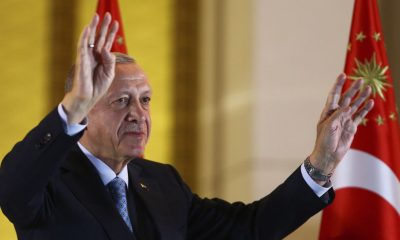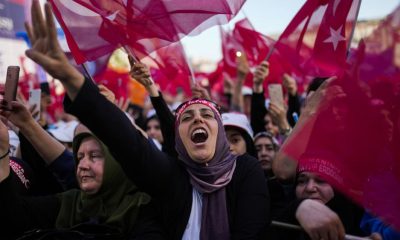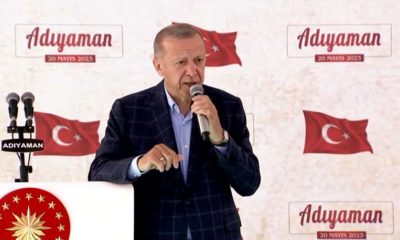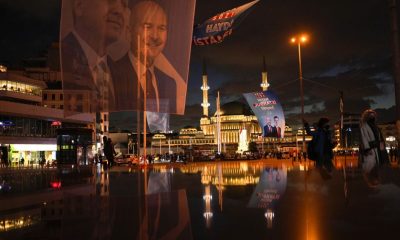General News
Turkish election: Five things we learned from the vote

From positions of power to kingmakers, the parties that did well, and the politicians fighting for survival in the second round of voting at the end of the month
Tens of millions of Turks went to the polls on Sunday in parliamentary and presidential elections, with millions more eligble to vote overseas.
So what did we learn so far from the results?
1. Erdogan and his party’s share of vote declined, but still in first place
This is the first presidential election where Erdogan hasn’t won in the first round. That’s already a shock for the Turkish political system.
But the president performed better than expected in the election, and the People’s Alliance led by his party retained a majority in Turkey’s 600-seat parliament. Analysts say that gives the Turkish leader an edge in the runoff because voters may want to avoid having different factions running the executive and legislative branches.
Erdogan said as much himself early Monday.
“We have no doubt that the preference of our nation, which gave the majority in parliament to the People’s Alliance, will be in favor of trust and stability in the (second round),” the president told his supporters in Ankara.
Kilicdaroglu, the leader of the Republican People’s Party, or CHP, said he was certain of a second-round victory, but Sunday’s results indicate he could struggle to attract enough votes even though he was the candidate of the six-party Nation Alliance.
2. Get ready for a quick and probably dirty fight for the second round of voting
Supporters of both leading candidates wasted no time in launching their campaign for votes in the second round election on 28 May.
And analysts suggest the campaigning before the runoff could be brutal.
Before Sunday’s vote, Erdogan disparaged the opposition as being supported by the outlawed Kurdistan Workers’ Party, or PKK. At one rally, he showed hundreds of thousands of his supporters a faked video purporting to show a PKK commander singing an opposition campaign song.
“Information control was President Erdogan’s greatest asset in running and entering the election season. And I think his media loyal to him has successfully framed HDP support to Kilicdaroglu as ‘terrorist support,’” Soner Cagaptay, an expert on Turkey at the Washington Institute think tank, said.
“That helped scare away some nationalist voters.”
Kilicdaroglu said Erdogan had failed to get the result he wanted despite slinging “slanders and insults” toward the opposition.
3. A right-wing party now in key position for the second round of voting
According to the preliminary results in the presidential election, the candidate of the ATA Alliance, Sinan Ogan, will receive more than 5% of the votes: that’s more than he was forecast to receive in the pre-election polls and means he will become an important kingmaker in the second round of voting.
Ogan is in a power position now, to instruct his voters to vote for either of the two candidates in the runoff election and potentially anoint Turkey’s next president.
CHP leader Kemal Kılıçdaroğlu made the first overtures towards the third place presidential candidate, calling Ogan after the election results were announced on Sunday last night and congratulating him on his vote tally.
After that, former Turkish Prime Minister Binali Yıldırım, a senior name in Erdgan’s AK Party, also called Ogan on Sunday night.
It’s not exactly clear which parties within the ATA Alliance favour, when it comes to the next round of voting but it’s thought a significant tranche of support came from the IYI Party, which didn’t want to vote for Kılıçdaroğlu.
But ATA also received votes from people who wanted to support Muharrem İnce, who withdrew from the race shortly before election day.
Soner Cagaptay, an expert on Turkey at the Washington Institute think tank, said most Ogan voters are likely to go for Erdogan whether or not their original candidate endorses the Turkish leader.
“It’s certain that Erdogan is going to sweep the second round,” Cagaptay said.
4. Kurdish supporters did not help opposition win the election
An alliance of pro-Kurdish parties got 66 seats in the new parliament, enough to make them the third largest bloc. But it wasn’t enough for the opposition to outnumber Erdogan.
The incumbent president’s AKP and its allies secured 321 seats in the National Assembly, while the opposition won 213 and the 66 remaining went to a pro-Kurdish alliance, according to preliminary results.
The pro-Kurdish Green Left Party, YSP, won the predominantly Kurdish provinces in the southeast.
5. Diaspora voters split along traditional party and country lines
More than 5 million people of Turkish descent live in Europe and their votes impacted the results, with each politician having their own regional strongholds.
Around 3.4 million of them are registered to vote abroad, compared to 64 million inside Turkey.
“There were not many surprises in the diaspora vote,” said Paul Levin, Director of Stockholm University’s Institute for Turkish Studies, told Euronews. “Erdogan remained strong in Germany and France as he did in 2018.”
Home to the largest Turkish diaspora, more than 700,000 votes were cast in Germany, with some 66% going to Erdogan (462,000), 33% for Kılıçdaroğlu (230,000) and 1% to Sinan Oğan, leader of the ultra-nationalist MHP (9,000).
“Turkish-origin Germans continue to vote to the left in German elections but conservative at home,” Levin told Euronews.
In France, which has the second-largest Turkish diaspora, Erdoğan also gained the lion’s share of the votes at (64%).
Earlier this month, brawls broke out between Turks at voting stations in France, with police officers using tear gas to prevent violence.
“Over-all Erdogan does well in the foreign vote, which therefore remains important for him, especially in close elections,” Levin told Euronews.
However, the results across Europe were polarised, with Kılıçdaroğlu dominating in the UK, southern and eastern Europe, Finland, Sweden and the Balkans.
Disclaimer: No copyright infringement intended. All rights and credits reserved to respective owner(s).






















